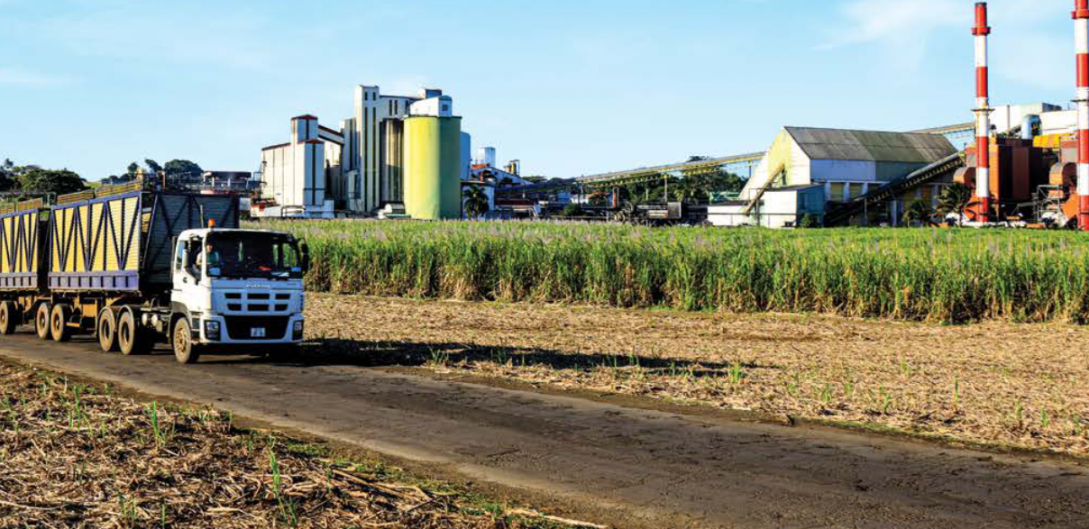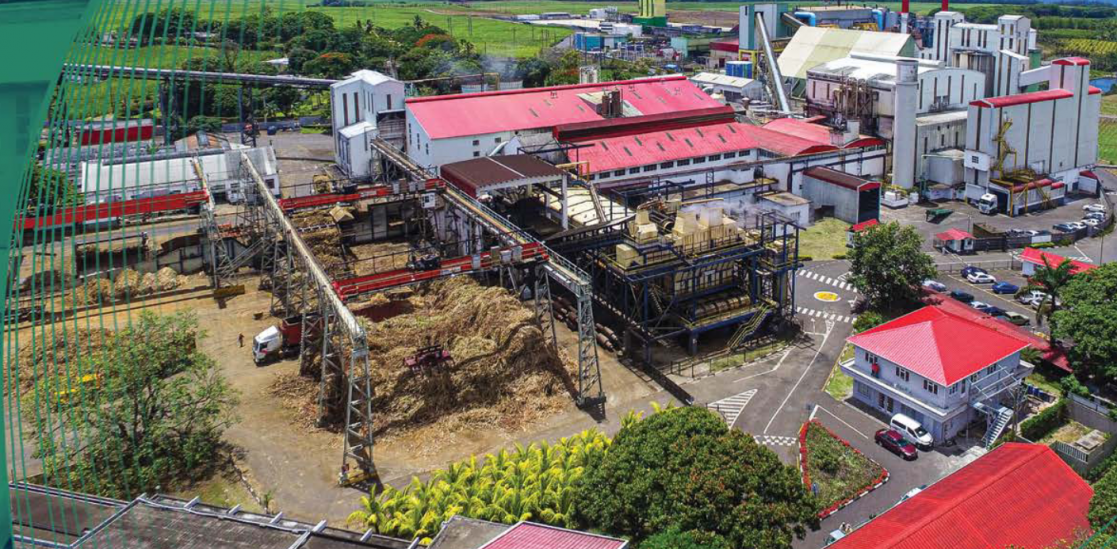Trade Success No.12: Omnicane Limited - The EPA empowering sustainable development in Mauritius

Omnicane Limited, incorporated in 1926, is a public company on the Official List of the Stock Exchange of Mauritius, leader of the modern sugarcane industry born of Mauritius’ centuries-old sugar industry.
The primary activity of the institution consists in the cultivation of sugarcane and the production of refined sugar, bioethanol, thermal energy and electricity.
Key facts:
- The Omnicane flexi-factory ‘Integrating Energies’ consists of 1 Sugar Refinery, 2 Cogeneration Power Plants and 1 bio-ethanol distillery.
- The factory possesses a crushing capacity of 8,000 metric tons of sugarcane per day.
- Growing over 3000 hectares of sugar cane field and producing 1.3 to 1.6 million tonnes of sugar cane per year.
- From the raw sugar of Omnicane and the one of Medine Sugar Estate, the refinery of Omnicane produces:
- Around 200,000 tonnes of refined white sugar mainly exported to the EU
- 450,000 tonnes of bagasse for the Cogeneration Power Plants
- 45,000 tonnes for the bioethanol distillery
- All the sugar produced by Omnicane is exported via the Mauritius Sugar Syndicate, principally to the EU (22 countries) with some also exported to East Africa, particularly Kenya.
Company profile:
Omnicane was launched through a strategic rebranding of Mon Trésor & Mon Désert Limited (MTMD), a long-established sugarcane group in Mauritius whose origins can be traced back to the 1850s. The MTMD was owned by various companies at the time including Lonrho, Illovo Sugar Limited and the holding BBHM up until 2009. Omnicane Limited was among the first companies to be listed on the Stock Exchange of Mauritius.
In 2003, Riche en Eau, Mon Trésor, Union St Aubin and Savannah consolidated the rationalisation of their milling operations in the south of Mauritius and established the Société Usinière du Sud Ltée (SUDS). The number of sugar mills operating in Mauritius therefore decreased from 17 in 1996 to 11. In 2008, the Company transferred its assets to SUDS and in 2009, the strategic rebranding of the Company led to the creation of Omnicane.
The Company has a strong stand on sustainable development and work to build resilience and equity with a sense of purpose, a culture of ownership and a long-term mindset. In 2020, Omnicane maintained its commitment to abide by the Bonsucro sustainability standards and successfully conducted its surveillance audit. The same year, the company also committed to adopt Business Mauritius’ sustainability pact, SigneNatir in 5 key areas: energy transition, biodiversity, vibrant communities, inclusive development and circular economy.
With sugarcane cultivation and transformation at the core of its activities, and with its cane sugar and energy operations centred in its flexi-factory complex, ‘Integrating Energies’ translates the company’s plan and executes its entire production as an integrated whole, for optimum flexibility, maximum efficiency, and, above all, minimal waste, notably by using one operation’s by-product as another’s raw material.
Omnicane has also maintained its commitment to abide by voluntary sustainability standards such as Fairtrade and ISO in its different operations.
The principle of circular economy at Omnicane focusing on eliminating waste and creating value from resources is illustrated in the model below (La Baraque industrial cane cluster).
Omnicane is a sustainability model in the Indian Ocean region for the following reasons:
- It uses bagasse during the sugar cane crop period to generate steam and electricity for the cluster and electricity for the National Grid
- Uses coal outside the crop period to produce steam and electricity for its refinery and distillery as well as electricity for the National Grid
- The second plant (smaller) at La Baraque uses wood chip and coal and caters for the distillery requirement in steam and electricity
- Owns and operates a coal fired power plant at St Aubin which produces electricity for the National Grid only
- The electricity exported by the Power Plants to the National Grid of Mauritius in a year represents just under 30 % of the total electricity generated by the island in a year
- Uses carbon burn out technology to make cement additives for the construction from the residues of power generations operations
- Produces up to 24 million litres of bioethanol yearly using bagasse – the bioethanol can be used in pharmaceutical and industrial products as well as a source of bio fuel in transportation and power production
- Manufactures liquid fertilizers and food grade carbon dioxide from residues of bioethanol manufacture (vinasse and raw gas)
- Uses energy saving diffuser technology for juice extraction
Main achievements over the years:
- In 2010, Omnicane opened the sole fully integrated flexi-factory complex in La Baraque in the South of Mauritius processing all sugarcane harvested in the south of the island.
- It is one of the largest bagasse and coal fired Cogeneration plant in the world
- In 2019, Omnicane became the first sugar mill and farm in Mauritius and in the African region to be certified to the Bonsucro standards including the Bonsucro EU RED certification.
- Omnicane is in process of completing a 5MW hydro-electrical power plant in Rwanda and is exploring other similar projects in East Africa.
How did the EPA help?
“We have been reliable suppliers of sugar to the EU since the commonwealth sugar agreement and the various agreements which have followed have had a significant contribution to our industry and to the country. The benefits of these agreements have irrigated our economy and helped its diversification.
- We see the EPAs as a fundamental tool for our industry as it provides us with a vital access to the EU market. As a Small Island Developing State, we have a very limited domestic market and access to a controlled market is key for us. Our strategy has been geared towards value addition and market access to the EU has been fundamental for us as it has opened doors to a sophisticated clientele who has at heart good quality products which are produced sustainably.
- The market access has enabled us to finance our value addition projects and has also encouraged us to further develop our circular economy model. Access to a sophisticated market, has enabled our company to embark in programs such as Bonsucro and VIVE. These certifications have pushed us to improve our processes, to get better prices and better market visibility for our products.
- The EPAs have also enabled us to establish long term partnerships with EU clients. These partnerships have been very important in terms of technical exchanges, product development and developing better synergies with our local stakeholders. Access to Fairtrade premiums which benefits to small planters have also contributed to enhancing revenues of vulnerable groups in the value chain.
- Having reliable and long-term partnerships has proved very worthy during the pandemic with the consequential freight disturbances. Strategic partners have managed to serve our clients and maintain the client-supplier relationship despite the logistic challenges.
- A very important aspect of the EPAs is that it has enabled our company and the country in general to have access to foreign exchange. This again has been vital during the pandemic.”
"Our strategy has been geared towards value addition and market access to the EU has been fundamental for us as it has opened doors to a sophisticated clientele who has at heart good quality products which are produced sustainably"
Omnicane Limited
Mr Jacques M. d’Unienville, Chief Executive Officer








